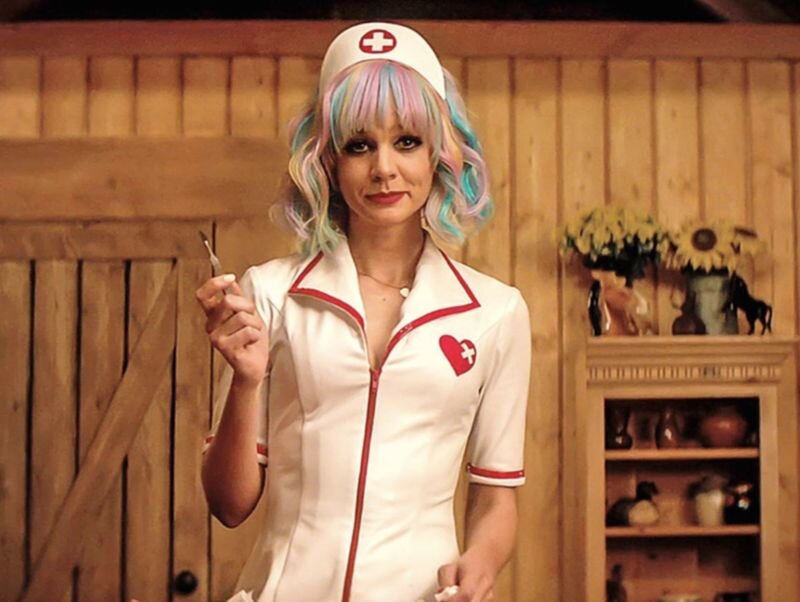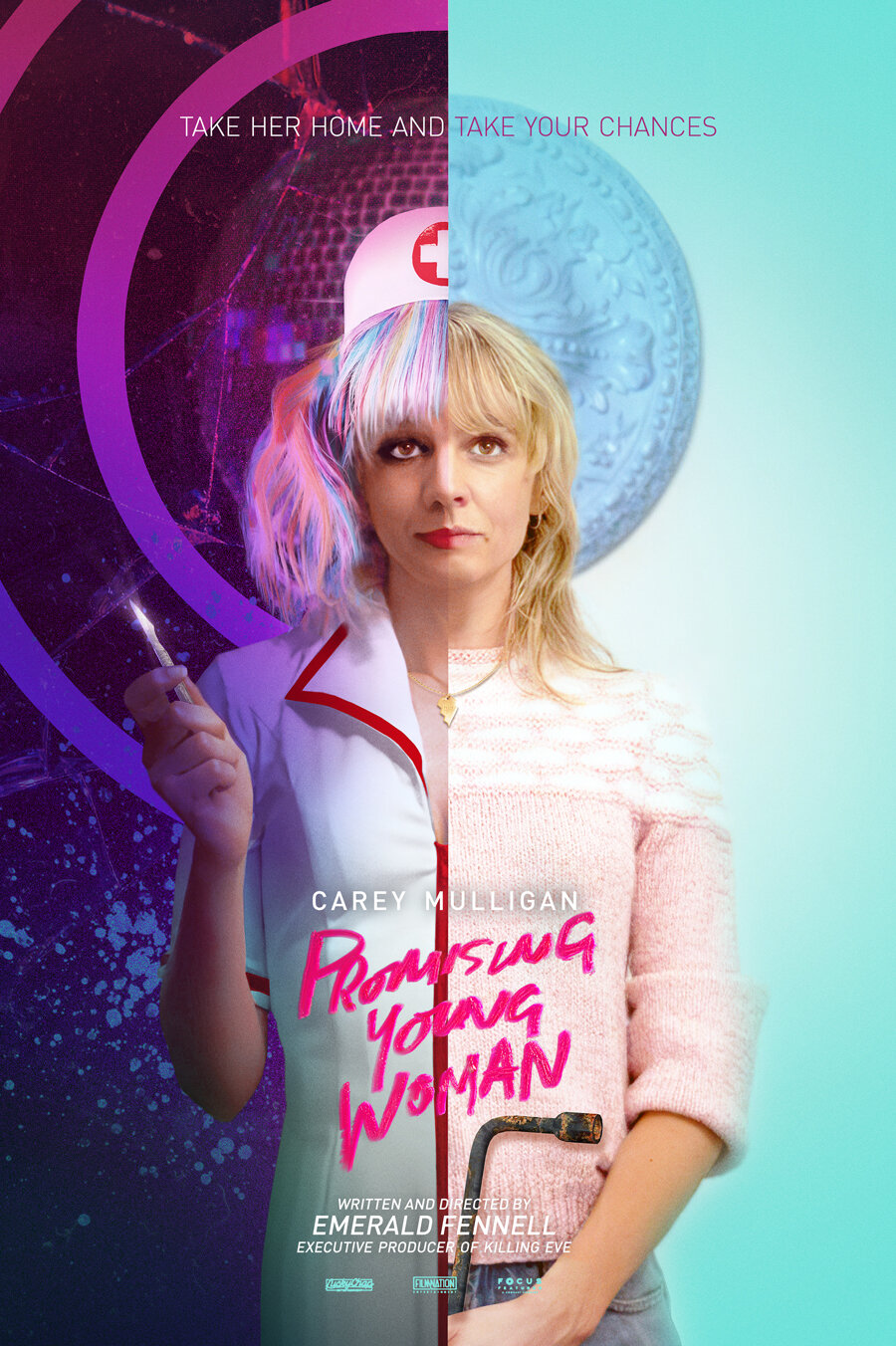Promising New Times? Female-Driven Films Tackling the Normalising of Crimes Against Women
The irresistible thriller picking apart entitlement, victimhood and the satire of a ‘promising’ young man ‘ruined’ by sexual assault allegations. Sigh …
*‘Promising Young Woman’ plot spoilers throughout article - be warned!
“When Emerald Fennell, the brilliant British filmmaker, collected her Academy Award for Best Original Screenplay, she quipped, eyes sparkling, that “he” was “heavy” and “cold”. Although she was referring to the gold-plated man named Oscar in her hand, Fennell’s choice of adjectives could also quite aptly describe the Academy Awards’ historic attitude to female filmmakers. “Heavy” could refer to the glaring (white) male bias of nominations and winners, especially in the Best Director category. In the award ceremony’s 93 year history, male directors have received a staggering 86 nominations and 91 have won. Where does this leave female directors? You do the maths.
Thankfully in 2021 times are a-changin’. This year two women were nominated for the Best Director Award, including Fennell. And for the first time in history, a woman of colour won the lauded gong: American-Chinese Chloe Zhao for ‘Nomadland’, her third feature film that she also wrote, edited and produced. It won Best Picture. So, after years of Oscar-winning films directed entirely through the male gaze, Zhao and Fennell’s momentous achievements are a sign that Time is finally Up: women’s stories are starting to break through the ice, to be seen and heard and championed, at long last.
The title of Emerald Fennell’s Oscar-nominated film, ‘Promising New Woman,’ successfully addresses many of the complex issues that women face every day of their lives, often involuntarily and unwittingly. Frequently undeservedly. Nominated for five Academy Awards including Original Screenplay which it won, Fennell’s plot has more twists and turns than an American election. Everything is unexpected and unpredictable; the writing is excellent and entertaining. A satirical black-comedy-revenge-thriller, the film shines the light on its female protagonist Cassandra, played by Carey Mulligan, who has been struggling in darkness since the sexual assault of her friend at medical school, which caused Cassie to drop out. "Promising young woman" no more, she is floating rudderless through life, still living at home with her parents aged 30, whilst moonlighting as a feminist vigilante at night - exposing sexual predators gives her a sense of vengeful purpose.
Innovatively, Fennell flips the rape revenge genre on its ugly head with her Trojan horse of a film that, like its protagonist, appears to be one thing - a sweet, approachable and 90s romcom - then reveals itself to be an altogether darker beast. Cassie is a Britney lookalike: girlish blonde hair, multicoloured nails and cutesy T-shirts. But, she is broken inside and determined to avenge her best friend, Nina's, death, which has been all but forgotten. PYW is an honest and unflinching portrayal of the tragic and shocking normalisation of rape culture. It highlights how life changing and traumatic a sexual assault can be yet the movie also emphasises how such demonic acts can easily become a thing of the past, forgotten by many, including the perpetrators, but never the victim, who goes on to suffer the worst blow. This is the ugly truth and the reality of millions of women and men. Bravely and boldly, Fennell presents some very real portrayals of very real issues. In interviews, she has claimed that she drew on some of her own personal experiences. And although the film may seem timely, these themes have been very real to very many women for centuries. Whilst the mise-en-scène is a sumptuous sugar coated feast with candy-coloured costumes and shiny sets, the topics are anything but frivolous - Fennell forces us to take them seriously: women are raped by apparently kind and harmless men who do get away with it. Other people are complicit bystanders. This powerful juxtaposition of sweet and sour leaves the bitterest taste in our mouths. Man or woman, everyone can relate to this film; most people have been there or know someone who has, in some capacity. And the title song, a sinister remix of Britney Spears’ Toxic, is a haunting reminder that toxic masculinity is endemic - "don't you know that you're toxic?"
“Female-driven films, casts and crew must be applauded for telling stories that reflect our times and challenge our notions of selfhood. It is our responsibility to change the narrative, to help future generations, to reduce the number of young girls’ stories of sexual abuse.”
Why are some of PYW's most realistic scenes so hard to watch? (If you have seen the film, you will know exactly which one(s) we are referring to…) Haven’t we been endlessly exposed to sordid stories about women being assaulted, raped and murdered? Yes, of course we have - but in Hollywood these women are not fully-formed characters, instead a lazy narrative trope, an empty plot device to shock and frighten and entertain: 2D female victims filmed through the male gaze. Not on PYW's watch. Cassie is entirely complex and 3-dimensional; her quest in this morality tale is entirely convincing because we understand her pain and desperation for justice. The brutal honesty unsettles us, forces us to confront her reality and our own - this is not a joke, this is not sensationalist, this is real, this is serious.
Historically, the opportunities for women to tell, share and control narratives on the silver screen have been few and far between, for obvious reasons. Which is why journalist Melanie Philips’ recent article in The Times that argued that “Promising Young Woman is yet another hyper-feminist drama about taking revenge on violent men” was puzzling. Are our screens really awash with “feminist drama(s)” written by women that highlight the reality of women's lives? The aforementioned Oscars statistics would certainly suggest otherwise and the seismic waves that Fennell’s story have made also suggest the contrary: real women’s stories are not being heard yet the incidences of sexual assault and the murder of women by men is huge. Why the vast disparity then, Hollywood?
Perhaps Philips should click onto 'Everyone’s Invited’, an online space for young women and girls to share their accounts of sexual violence. Since March 2021, over 15,000 anonymous testimonies have been posted. A trigger warning sits above the endless stories of misogyny, physical and verbal harassment and non-consensual physical assault. This cautions the reader that the following content is disturbing and likely to spark mental distress if they are vulnerable. If we take the United Kingdom’s YouGov poll figures, which revealed that four-fifths of young women have been sexually harassed, this means that the trigger warning applies to practically everyone. All females are vulnerable. And so the cycle continues. Are you following, Philips? Is it "hyper-feminist" to highlight the terrible prevalence of rape culture? Are you suggesting that it's not worth talking about?
Soma Sara, the platform’s 22-year-old founder, started this safe space to address the reality and normalisation of rape culture, and to give fellow females a voice. Many testimonies have never been shared for fear that they wouldn’t be believed or that they might be blamed. This fear silences women who instead suffer under the weight of shame. Many incidents take place in schools, with victims as young as 9-years-old. This means that rape culture is rife - it is part of a girl’s education - and universal. It is normal for a boy or a man to take advantage of a girl or a woman, to intimidate them to get what they want. And, oftentimes, due to the natural, inherited fragile male sense of entitlement within their toxic patriarchy, the female’s voice is lost in the wind, the assault disappears into thin air, leaving him guilt free. Whilst the traumatic incident will seep into the bones of the girl, the insidious residue poisoning her for the rest of her life.
It is refreshing and hopeful that online communities like Sara’s are being built. It is fantastic that Fennell's film was bought by Lucky Chap Productions, with Margot Robbie at the helm. It is positive that gender-based violence is getting the spotlight and exposure that it deserves. The tsunami of emotion and passionate protests held in the wake of Sarah Everard’s murder must contribute to positive change. Recent allegations of sexual assault, harrassment, unwanted touching and rape within British schools has also sent shockwaves through the media. Yet, to women and girls, these claims are probably not shocking at all. In fact, as the aforementioned poll proves, it’s a sad fact of life for many young females. And who or what should we blame for these gender based attacks? The widespread use of pornography from a very young age - most of which glorifies violence against women? The acceptance, and portrayal, of toxic masculinity in the media? A lack of education? Whomever we blame, the point is that it should not be the woman.
“All women are heroic: we are all victims, survivors, winners”
This conflicts strongly with Melanie Philips’ biting article that not only criticises PYW but is reductive about the other Oscar-nominated films which, according to her, “read like a social justice warriors’ handbook”. She argues that “people have had enough of the victimhood agenda.” Have we? Have we though!? Beneath her article are messages of congratulations from Times readers who agree wholeheartedly with Philips whilst ranting on about “woke warriors” and “virtue-signalling lefties”, which presumably, includes Fennell and Zhao, and us. But these Oscar-winning female directors needn’t worry, because they have been decorated for their work, their truth telling and they will not be silenced.
Have the 2021 Academy Awards finally heralded a momentous change for the greater good of our society? Are the voices of women and people of colour finally being heard? Although there is a long way to go, with more females and POC nominated, and winning, than ever this year, perhaps Hollywood’s highest accolades are finally catching up with the times. Maybe the “cold” and “heavy” patriarchal boundaries have been broken. Maybe now we can destroy taboos, obliterate the normalisation of horrific common crimes to help victims come forward, to relieve them of their undeserved shame, to educate our sons to do better so that these crimes stop, and to unite both genders who deserve to be seen and heard. Like Cassie, these women are heroic. All women are heroic: we are all victims, survivors, winners. Female-driven films, casts and crew must be applauded for telling stories that reflect our times and challenge our notions of selfhood. It is our responsibility to change the narrative, to help future generations, to reduce the number of young girls' stories of sexual abuse. Isn’t that what good storytelling is all about?”
-
Thank you so much to the endlessly brilliant and eloquent Rachel for this incredible contribution to TIGC site- we hope you loved reading it as much as we did! To see more from Rachel you can find her on Instagram at @rachelwarrior1 or via her website rachelwarrilow.wordpress.com.



